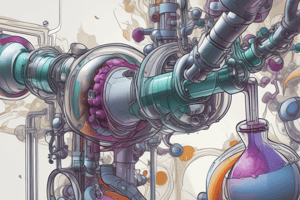Podcast
Questions and Answers
What is the process in which a compound transfers from one solvent to another owing to the difference in solubility or distribution coefficient between these two immiscible solvents?
What is the process in which a compound transfers from one solvent to another owing to the difference in solubility or distribution coefficient between these two immiscible solvents?
- Filtration
- Solvent extraction (correct)
- Crystallization
- Distillation
What is the name for liquids that cannot mix together and separate into layers when shaken together?
What is the name for liquids that cannot mix together and separate into layers when shaken together?
- Miscible liquids
- Emulsifiable liquids
- Soluble liquids
- Immiscible liquids (correct)
Which separation method provides a better separation effect than chemical precipitation, and a higher degree of selectivity and faster mass transfer than the ion exchange method?
Which separation method provides a better separation effect than chemical precipitation, and a higher degree of selectivity and faster mass transfer than the ion exchange method?
- Solvent extraction (correct)
- Distillation
- Filtration
- Crystallization
What are the two types of solvents involved in solvent extraction?
What are the two types of solvents involved in solvent extraction?
What advantages does solvent extraction have over distillation?
What advantages does solvent extraction have over distillation?
What is the term for the process in which a compound transfers from one solvent to another due to the difference in solubility or distribution coefficient between these two immiscible solvents?
What is the term for the process in which a compound transfers from one solvent to another due to the difference in solubility or distribution coefficient between these two immiscible solvents?
What is the ratio that describes the distribution of a compound between two immiscible solvents?
What is the ratio that describes the distribution of a compound between two immiscible solvents?
Which factor affects the separation efficiency in solvent extraction by influencing the transfer of a solute from one solvent to another?
Which factor affects the separation efficiency in solvent extraction by influencing the transfer of a solute from one solvent to another?
Which type of extraction method provides a better separation effect than chemical precipitation and a higher degree of selectivity and faster mass transfer than the ion exchange method?
Which type of extraction method provides a better separation effect than chemical precipitation and a higher degree of selectivity and faster mass transfer than the ion exchange method?
What is the main advantage of solvent extraction over distillation, as mentioned in the text?
What is the main advantage of solvent extraction over distillation, as mentioned in the text?
What is the driving force behind the transfer of species from one liquid phase to another in liquid-liquid extraction?
What is the driving force behind the transfer of species from one liquid phase to another in liquid-liquid extraction?
What is the term used to describe the solvent enriched in solute(s) in liquid-liquid extraction?
What is the term used to describe the solvent enriched in solute(s) in liquid-liquid extraction?
What is the primary purpose of performing liquid-liquid extraction in chemical laboratories?
What is the primary purpose of performing liquid-liquid extraction in chemical laboratories?
What is the common apparatus used for liquid-liquid extraction in chemical laboratories?
What is the common apparatus used for liquid-liquid extraction in chemical laboratories?
What is the term used to refer to the underlying chemical and physical processes involved in liquid–liquid extraction?
What is the term used to refer to the underlying chemical and physical processes involved in liquid–liquid extraction?
Flashcards are hidden until you start studying
Study Notes
Solvent Extraction Process
- Solvent extraction is the process of transferring a compound from one solvent to another based on solubility or the distribution coefficient.
- This technique exploits differences in solubility between two immiscible solvents.
Immiscible Liquids
- Immiscible liquids are those that cannot mix and will separate into distinct layers when combined.
Separation Methods
- Solvent extraction offers superior separation compared to chemical precipitation, with better selectivity and faster mass transfer than ion exchange methods.
Types of Solvents
- The two types of solvents involved in solvent extraction are the extractant (the solvent containing the target compound) and the raffinate (the remaining solvent).
Advantages of Solvent Extraction
- Advantages over distillation include:
- Greater selectivity for desired compounds.
- More effective separation of complex mixtures.
- Lower energy requirements.
Distribution Ratio
- The distribution coefficient describes the ratio of a compound's concentration in one solvent compared to another immiscible solvent.
Factors Influencing Separation Efficiency
- The separation efficiency in solvent extraction is influenced by the transfer kinetics of the solute from one solvent to another.
Liquid-Liquid Extraction
- Provides an efficient separation method, greater selectivity, and is faster in mass transfer than ion exchange methods.
Driving Force
- The driving force for transferring species in liquid-liquid extraction is the difference in concentration and solubility between the two liquid phases.
Solvent Enriched in Solutes
- The term for the solvent enriched in solute(s) during the process is the extract.
Purpose of Liquid-Liquid Extraction
- The primary purpose is to isolate and purify specific compounds from complex mixtures in chemical laboratories.
Common Apparatus
- A separatory funnel is commonly used for performing liquid-liquid extraction in chemical laboratories.
Underlying Processes
- The term referring to the chemical and physical processes involved in liquid-liquid extraction includes extraction dynamics and mass transfer principles.
Studying That Suits You
Use AI to generate personalized quizzes and flashcards to suit your learning preferences.




